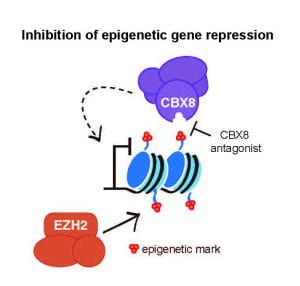 A decade ago, genome sequencing revealed a big surprise: about 50 percent of human cancers are linked to mutations in what are known as epigenetic regulators, which control the activity of genes.
A decade ago, genome sequencing revealed a big surprise: about 50 percent of human cancers are linked to mutations in what are known as epigenetic regulators, which control the activity of genes.
In a new study in Cell Chemical Biology, a team of scientists led by Oliver Bell from USC and Stephen V. Frye from the University of North Carolina at Chapel Hill developed a new drug-like molecule that can counteract the effects of mutated epigenetic regulators, which are known to drive certain types of cancer including lymphoma.
In healthy cells, epigenetic regulators play an essential role: turning on and off the activity of hundreds of genes in the precisely orchestrated sequence that directs normal human development.
One of these epigenetic regulators, EZH2, controls the transient inactivation of specific genes in order to permit the maturation of immune cells. However, mutated EZH2 may cause persistent repression of these genes, thus preventing the immune cells from developing normally and ultimately leading them to transform into cancerous malignancies.
The good news is that in contrast to many other types of mutations, cancer-causing mutations in epigenetic regulators are potentially reversible by therapeutic drugs. With this in mind, first author Junghyun L. Suh and the research team set out to design a drug-like molecule to reverse the cancer-causing gene repression by EZH2.
To read more, visit https://stemcell.keck.usc.edu/cbx8.